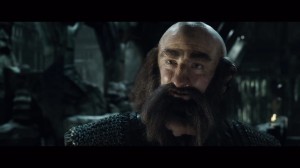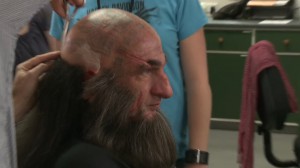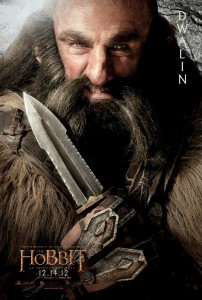 Here’s the transcript of an interview with Graham McTavish conducted with TheOneRing.net and a handful of other reporters on the set of The Hobbit: The Battle of the Five Armies.
Here’s the transcript of an interview with Graham McTavish conducted with TheOneRing.net and a handful of other reporters on the set of The Hobbit: The Battle of the Five Armies.
Question: We were just discussing our favorite dwarves. Do you have a favorite dwarf?
 Graham McTavish: My favorite dwarf? Wow.
Graham McTavish: My favorite dwarf? Wow.
Question: Present company excepted.
Graham McTavish: Present company excepted? I have a very soft spot for Ori. I do. Very soft spot for Ori. Because he’s the guy who you wouldn’t expect to be on a journey like this, but he wants to come anyway. So I think that’s something very courageous about him. And I think that appeals to Dwalin, as a character, it appeals to me as well, as an audience member. I think a lot of people will be rooting for Ori in the story.
Question: Do you guys know things about the other dwarves than yourselves that no one else knows, that will never actually be in the– About the characters, not so much–
Graham McTavish: (interrupts) Yeah. Both, definitely.
Question: You can tell us about the–
Graham McTavish: (interrupts) Yeah, I can tell about a night out that we’ve had. Yeah, we spent a lot of time in the three months before we started shooting doing a lot of background on ourselves and our inter-familial relationships and how well we knew each other. From my point of view, I came to the conclusion that, essentially, Dwalin was there for Thorin and his brother Balin. That was why he was there. His journey is a journey to reclaim the sense of honor and for the Dwarven people. And I think that motive may be slightly different from some of the other guys. Some are more motivated by the money and all the rest of the treasure. And I think that Dwalin didn’t know some of them. He may have heard of them, but I don’t think he had anything to do with Bofur and Bombur and Bifur. I don’t think he would have– I think his default is not to trust people until they prove that they’re worthy of trust. And I think he has that attitude to most people apart from the ones that he’s very close to. Which he is loyal to to a fault. So yeah, that’s how I came at it.
Question: So do you guys feel like– Obviously, you’re coming close to the end of the project. Do you still feel like a family now?
Graham McTavish: Oh, God, yeah. Yeah, we had a few guys over for dinner a couple of nights ago, and what really struck me was, very early on in the job we did the same thing, we had had a lot of people over for dinner, and the feeling was so different this time. Very, very relaxed. Very at ease with each other in a way that you are with people that you’re very close to. I mean, all the piss-taking and everything aside, everyone is very close, actually. Surprisingly so in some cases. And we’re very sad because it’ll be the last time that Ian’s here before he finishes on Friday, and we were very conscious of that. And that will be a very– Tomorrow going to be a very sad day I think. God, thirteen years, I think. Was it? Thirteen years he’s been– Or something.
Question: Do you know of anything planned to honor it? He wasn’t sure if he knew either, so–
Graham McTavish: I know nothing. I know nothing.
Question: What’s been the most unexpected part of this whole experience for you? What did you not see coming?
Graham McTavish: Well, honestly, I would say that– And this isn’t to sound glib, but almost every day there is something unexpected. Truly. From the day we arrived when we went on the tour of Weta, which was just– I still go back to relive that experience of going around that building. I just find it jaw-dropping every time I go. From that to every day you turn up on set. Like today, we arrive and there’s this incredible set. And you never get really blasé about it. I don’t. I look at it and I go, “This is incredible.” And I think the other surprising thing for me is being able to enjoy it as an actor, but also to enjoy it as somebody who’s enjoyed these films as an audience member as well, to be aware of that and really savor it. It’s an unique experience from that point of view, I think.
 Question: How do you use the daily makeup time? Those hours.
Question: How do you use the daily makeup time? Those hours.
Graham McTavish: (overlaps) How do I use it?
Question: Yeah.
Graham McTavish: Actually, it’s funny. We get to know each other very well– That’s one of the ways we get to know each other very well because we’re sat next to each other for quite some time. And you talk about everything. Your families, your politics, your religion, your whatever, this and that, everything comes up. And a lot of humor. A lot of humor. We have a great laugh, actually. And it’s one of the times I’ll miss, weirdly, the most. Even though it’s all about getting this stuff on, it’s a nice process with them.
Question: How many hours does it take?
Graham McTavish: An hour and a quarter for the prosthetics, forty-five minutes for the hair, and then I’m ready to come over here after about two hours, two and a quarter.
Question: Who has the longest process?
Graham McTavish: Bombur. Bombur. Yeah. I always look at his call time and it’s always thirty, forty minutes before me. So that many pieces that he has, everything else, it’s quite quite something. And you never know– I mean, I only know what it feels like to be Dwalin in terms of the outfit, and I can’t imagine what it must be like for him. It’s hard yards he puts in wearing that costume.
Question: How has this experience changed you? If it has at all.
Graham McTavish: That’s a good question. Well, you learn to take in an experience over a long period of time, and that’s something that you rarely get the opportunity to do as an actor. And I think that allows you to grow, both as an actor and also as a character. And that’s quite a gift that they’ve given you with this. Apart from the obvious, getting to know people over a long period of time, getting to know a country, getting to know all the crew, it’s been a very inclusive experience from that point of view. And that’s probably the thing I’ll take away from it best.
 Question: So for you to realize your character, to be in your character, you probably have to do a little more than there’s ever going to be on film. So how do you inform yourself about your character? You talked about his motives for being there, but <indistinct>.
Question: So for you to realize your character, to be in your character, you probably have to do a little more than there’s ever going to be on film. So how do you inform yourself about your character? You talked about his motives for being there, but <indistinct>.
Graham McTavish: Yeah, I draw very much on people that I’ve known, people like Dwalin. I know a lot of people in Scotland like Dwalin who you’ll meet in a bar, and they don’t talk much, but when they do, they talk to a purpose. It’s very clear how they feel. They’re not big on small talk. Even my own father, I’ve drawn on my father who is a working class Glaswegian who behaved in a very particular way towards people. And every time I go out there, there’s a little bit of my dad going with me, that’s for sure. I mean, he wasn’t violent, but he– Well, on occasion maybe he was. Not towards me. But yeah, quick-tempered, and wasn’t shy of confronting people. I try and feel a sense of honor, I think, about Dwalin. I think he’s an honorable man. Or an honorable dwarf, I should say. And I think that informs everything he does. He’s not shy of telling you if he doesn’t like what you’re doing, but he’s very supportive of anybody that’s giving everything they can. That’s why I think I like Ori, to go back to that. I think, as a character, I have a very strong admiration for what he is doing. Because it’s hard for him. He’s never done anything like this before. And that’s how I train.
Question: So for this particular film, are there some bits of business that you’ve been given that aren’t on the page in the novel?
Graham McTavish: Yeah. A lot of what we’ve done is very new, because a lot of the dwarf characters were quite sketchily drawn in the book, and we’ve had to, for our own purposes, invent a great deal, and also in terms of the script, a lot has been written that isn’t there necessarily in the book. But I think that’s great because it makes all those characters a lot richer.
Question: What contribution do you think was your biggest?
Graham McTavish: My contribution? Oh, my gosh. I don’t know. My biggest contribution. Not falling over. No, no. I think maybe that I really, really put everything I could into every single day. And I think for some people, not on this job, but for some people this kind of thing would be tough. It would be tough. It’s all this and that. But I feel very privileged to be doing it, so I try and use that to inform everything I do and everything I say to people.


